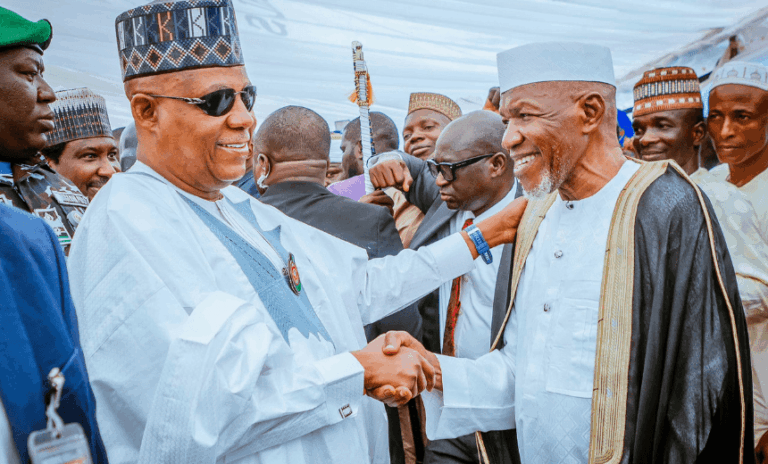Seyi Vodi, the celebrated Nigerian shoemaker and fashion entrepreneur, is no stranger to hosting notable personalities in his shop. From famous musicians like 2Baba to influential public figures, his store has welcomed many visitors. But when the Vice President of Nigeria, Kashim Shettima, showed up unexpectedly, it was a moment that caught many by surprise—including me. I had to pinch myself, wondering, Is this really the VP?
For every Nigerian who cares deeply about the nation’s growth, witnessing Vice President Shettima’s visit to Vodi’s shop was historic. In many countries, it’s common for top leaders—be it the US President or the UK Prime Minister—to casually patronize local businesses. Unfortunately, in Nigeria, such gestures remain rare. Politicians often avoid buying local products in person, preferring online orders or delegating the task to aides, despite the constant rallying cry to Buy Naija, Grow Naija.
The last time a sitting Vice President made a similar meaningful connection with a homegrown business was during President Buhari’s administration. Then-Vice President Yemi Osinbajo personally supported a young shoemaker, Omale Ojima, following a heartfelt tweet. Osinbajo became a regular patron, showing rare commitment to Nigerian entrepreneurs—until tragedy struck with Ojima’s untimely passing. The nation mourned, and Osinbajo’s public condolences reflected the deep impact of that bond.
Shettima’s visit to Vodi’s store echoes that spirit and sets a new standard. It wasn’t a political stunt or electioneering gambit; the Vice President genuinely admired the quality and craftsmanship of the shoes. His excitement was evident as he tried on the products, praising their simplicity and durability. At one point, he jokingly expressed concern about global fashion giants like Louis Vuitton taking note of Vodi’s designs—proof of their excellence. Vodi, ever the humble host, reassured the VP that everything was authentically Nigerian-made, and even showcased new machinery helping scale production.
This candid interaction—the warm conversation between Vodi and Shettima—was the highlight for many. It’s the kind of visit that gives hope to countless Nigerian entrepreneurs dreaming of similar recognition and support. Imagine a Nigeria where we fully embrace what we produce, valuing our goods as much as any foreign import. Our nation would undoubtedly be stronger for it.
A particularly touching moment came when Vodi showed Shettima one of his clothing lines celebrated overseas, admired for its green and white colors—the very hues of Nigeria’s flag. It’s a powerful reminder of the deep patriotism Nigerians hold both at home and abroad. The green and white symbolize unity, pride, and hope—values every citizen should uphold.
This brings us to a vital question: Do role models still exist in Nigeria? And can our country still be a land of great opportunity? Seyi Vodi answers with a resounding yes. From a young corps member who learned tailoring to enduring long bus rides from Aba to Abuja to meet customer demands, Vodi’s journey is one of relentless grit and belief in Nigeria’s potential. His decades of hard work earned him the Vice President’s respect and historic visit—not luck or shortcuts.
Young Nigerians would do well to study Vodi’s life and others like him. The promise of “light at the end of the tunnel” isn’t about viral fame or quick wins; it’s about dedication, perseverance, and faith in the process. Success shines brightest for those who toil patiently—and Vodi exemplifies this truth.
Finally, the mantra Buy Naija to Grow Naija comes with responsibility. It doesn’t mean blindly supporting local products regardless of quality. Excellence is key. Subpar goods will inevitably be rejected, no matter how patriotic the call. The Vice President’s patronage was based on genuine quality—he’s been a customer for over a decade. That’s how trust and loyalty are built. Vodi’s craftsmanship has even attracted international leaders, setting a standard that Nigeria’s future must embrace.
Sadly, many young Nigerians who leave the country tend to undervalue those who stay, succumbing to the so-called Japa syndrome, which views success abroad as the only option. But Vodi’s story stands as a powerful counter-narrative. He stayed, he built, and he succeeded—right here in Nigeria, through excellence and resilience. These are the role models we need to celebrate and emulate. In a time when many see fleeing as the only path forward, Vodi’s example reminds us that greatness can still be created at home.

